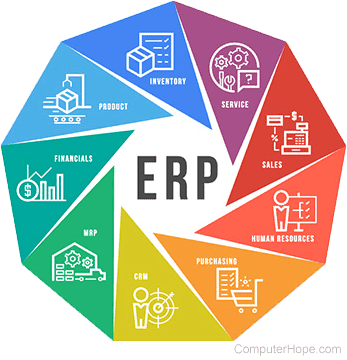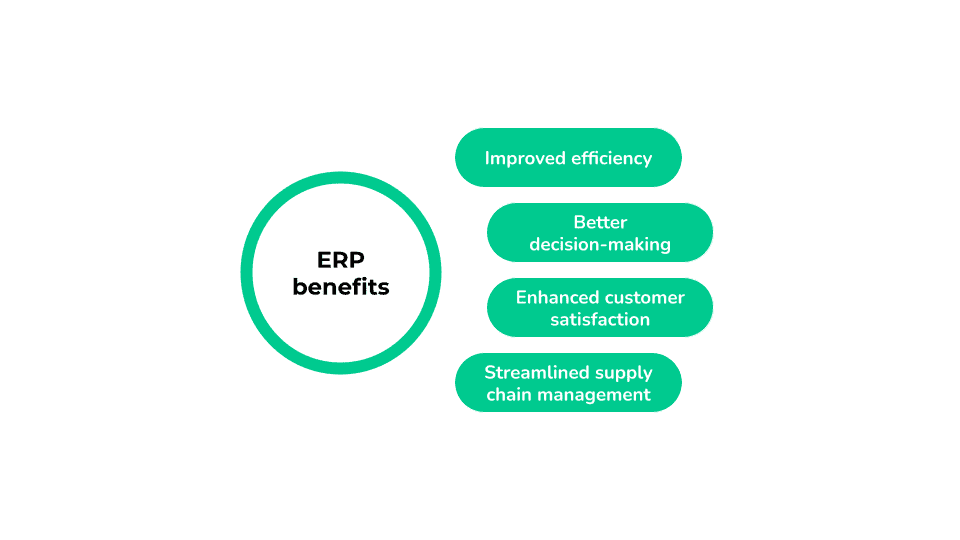What is ERP: Definition, benefits, and common challenges
Enterprise Resource Planning (ERP) is a crucial tool for businesses of all sizes to manage and automate operations. Whether small or big, adopting an enterprise resource planning system brings advantages like better efficiency, increased productivity, and improved decision-making.
In this article, we’ll give an overview of ERP, explain its benefits, and touch on common challenges during implementation and management.
What is an ERP system?

An ERP system is software that brings together and handles different business processes in a company. It integrates different business processes, such as finance, HR, supply chain, and customer management, into one central database and user interface for easier management.
For example, a manufacturing company using an ERP system can seamlessly connect its finance department, HR team, supply chain managers, and customer service representatives all on one platform.
This means that when a new order comes in, the system automatically updates inventory levels, triggers production, manages invoicing, and tracks shipment status, all in real-time.
Everyone involved has access to the same up-to-date information, which minimizes errors, delays, and miscommunications.
ERP systems in different industries
Let’s take a look at some real-life examples of how an ERP system benefits various sectors.
Manufacturing
Manufacturing relies on ERP systems like SAP ERP or Oracle NetSuite to keep everything running smoothly.
They help manage production, track orders, and handle inventory.
Optimizing the supply chain and reducing delays saves manufacturers time and money. ERP software also improves teamwork by bringing different departments together.
Retail
Retailers rely on ERP solutions such as Microsoft Dynamics 365 or Epicor ERP to keep their businesses in tip-top shape.
These systems manage sales, inventory, and customer data.
Staying up-to-date on sales trends and stock levels helps retailers make smarter decisions and ensure customers find what they need.
Healthcare
The healthcare industry organizes patient records and handles billing tasks using ERP systems like Cerner or Meditech.
Doctors and staff can access patient information quickly and securely, leading to better patient care.
ERP software also helps manage resources, like scheduling staff and keeping medical supplies stocked.
Financial services
Banks and financial institutions trust ERP software like Finastra or FIS to handle their finances with ease.
ERP systems take care of accounting, financial reporting, and following important regulations.
Keeping all financial data together helps financial institutions plan ahead and make informed choices.
Hospitality
Hotels and the hospitality industry benefit from ERP systems like Opera by Oracle or Infor Hospitality Suite to provide excellent service.
ERP solutions handle reservations, guest services, human resources, and much more.
Connecting different departments, like the front desk and housekeeping, ensures hotels can provide guests with a wonderful experience.
Benefits of ERP systems

Examples of ERP benefits
Using enterprise resource planning (ERP) software can be highly advantageous for organizations in various industries. Here are some key benefits:
Improved efficiency and productivity
Automating manual tasks and streamlining workflows through ERP solutions lead to better overall efficiency and increased productivity.
Employees can focus on more valuable activities when routine tasks are automated and manual data entry is eliminated.
Better decision-making capabilities
Real-time access to accurate and up-to-date data provided by an ERP solution empowers organizations to make informed decisions quickly.
Integrated reporting and analytics capabilities offer valuable insights into operations, identifying trends, patterns, and opportunities for data-driven decisions that optimize performance and achieve strategic objectives.
Enhanced customer satisfaction
With enterprise resource planning software, customer-related data is centralized, enabling organizations to improve customer relationship management.
Having a 360-degree view of customer interactions helps personalize engagement strategies, deliver seamless customer experiences, and build long-lasting relationships.
Streamlined supply chain management
An ERP system optimizes supply chain management by improving inventory management, procurement processes, and demand forecasting.
Automation in these areas leads to reduced lead times, minimized stock-outs, and overall improved supply chain performance.
Common challenges in implementing an ERP system
While adopting an enterprise resource planning system brings significant advantages, organizations may encounter hurdles during implementation and management.
Let’s explore some common challenges and ways to tackle them:
Complexity and customization: Every organization has unique needs, and customizing off-the-shelf enterprise resource planning systems can be complex and time-consuming.
However, view this as a chance to optimize processes and enhance efficiency.
Collaborate closely with experienced ERP consultants who can help strike the right balance between customization and simplicity.
Data migration and integration: Migrating data from legacy systems and ensuring seamless integration can be challenging.
Use this opportunity to clean and organize your data, making it accurate and complete.
Work closely with the ERP vendor to plan a smooth migration and integration strategy that facilitates data flow between systems.
User adoption and training: Introduce the new ERP software system as a way to streamline tasks and boost productivity.
Invest in comprehensive training programs to empower employees.
By highlighting the positive impact on their work, employees will be more receptive to change and enthusiastic about using the system.
Cost and budget management: See ERP implementation as a strategic investment with long-term benefits.
Work with ERP vendors to understand pricing structures and negotiate a suitable deal.
Allocate resources wisely, considering the potential return on investment in terms of efficiency and cost savings.
Conclusion
Implementing and managing a modern ERP system can revolutionize the way organizations operate, enabling them to achieve greater efficiency, productivity, and decision-making capabilities. By understanding the definition of an ERP system, its benefits, and the common challenges associated with implementation, organizations can make informed decisions and effectively leverage these systems to gain a competitive edge.
If you’re considering implementing an ERP system for your organization, Right People Group can provide you with experienced freelance ERP consultants who specialize in ERP implementation and management. Our consultants have the expertise and knowledge to help you navigate the complexities and ensure a successful ERP journey. Contact Right People Group today to find the perfect consultant for your ERP needs.
ERP systems implementation and customization
We connect skilled ERP developers with specialized expertise to help businesses optimize and streamline their operations through tailored enterprise resource planning solutions.
Oracle Forms development
We provide Oracle Forms developers who specialize in creating efficient database applications with modern interfaces while maintaining legacy system compatibility.
Software architecture design
We provide software architecture services to design and implement scalable, custom solutions that align with your business objectives and technical requirements.
SAP material management
We provide SAP MM experts who optimize your material management processes and streamline procurement systems to maximize efficiency and reduce costs.
Business analysis and consulting
We deliver business analyst experts who bridge the gap between IT and business, turning your operational challenges into strategic advantages that unlock sustainable growth.
SAP business consulting
We deliver SAP Business Consulting expertise to streamline your organization's operations and enhance business performance through strategic solutions.
Need an expert consultant?
Get highly specialized IT and business consultants with deep technical and professional knowledge. We offer flexible solutions for both individual consultants and complete teams.
17+
years experience in the IT- and business consulting industry.
50+
dedicated employees
500+
consultants on assignments
15.000+
pre-screened consultants
Find consultants
Services
About us
Copyright © 2025 Right People Group. All rights reserved.
